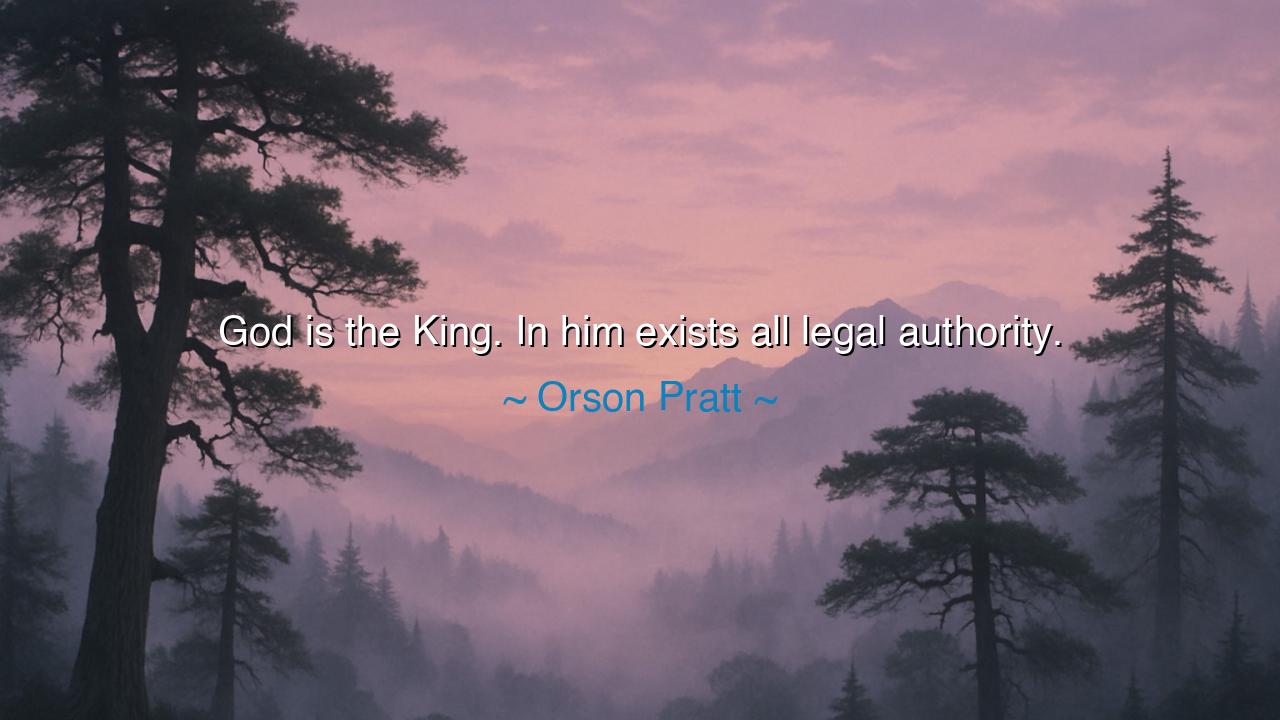
God is the King. In him exists all legal authority.






Hear the solemn proclamation of Orson Pratt, a voice of the 19th century who spoke as both preacher and philosopher: “God is the King. In him exists all legal authority.” These words resound like thunder across the ages, declaring that true sovereignty does not lie in crowns of gold nor in the parchments of human law, but in the eternal throne of the Almighty. They remind us that before nations were drawn on maps, before legislatures carved statutes into stone, there was already a higher law—unchanging, righteous, and supreme.
When Pratt says, “God is the King,” he speaks to a truth that has guided prophets, monarchs, and simple believers alike: that all human power is but a shadow of divine authority. Kings may rule for a time, presidents may decree, and judges may interpret, but their authority is fleeting. Only God reigns with absolute justice, and His law is not swayed by ambition or corrupted by greed. In Him, the origin of justice is found, and apart from Him, every system of law is but a fragile imitation.
The phrase “in Him exists all legal authority” goes deeper still, teaching that no earthly power can claim legitimacy unless it is rooted in the eternal order of right and wrong. A government that strays from righteousness forfeits its moral claim to rule, for its authority is borrowed, not self-made. This echoes the ancient teaching that rulers are but stewards, entrusted with power by the divine, and held accountable for how they wield it.
History gives us a powerful example in the story of Magna Carta in 1215. When King John of England abused his power, the barons rose to demand a charter that bound even the king to law. Yet even this document, often hailed as the foundation of liberty, acknowledged that the authority of law came not from men alone, but from a higher standard. “To no one will we sell, to no one deny or delay right or justice”—these words echo the idea that justice flows from above, and no earthly throne can alter it. Pratt’s declaration stands in this same tradition: God is the true fountainhead of legal authority.
The meaning of Pratt’s words is not merely historical but also deeply motivational. They call each generation to remember that when laws are unjust, when authority is corrupted, when rulers exalt themselves above the people, then they have strayed from the source of true power. Such laws may be written, but they are not righteous; such rulers may command, but they do not truly reign. To resist tyranny in the name of justice is not rebellion against law, but loyalty to the highest law of all.
At the same time, this teaching is humbling. For if all authority belongs to God, then no man or woman may exalt themselves as supreme. The judge must rule with fairness, the governor with compassion, the parent with wisdom—each remembering that their authority is not their own, but a trust from above. This awareness breeds humility, for it reminds us that we all must one day give account to the true King for how we wielded the power entrusted to us.
Children of tomorrow, let this lesson guide your steps: respect the laws of your land, but measure them always against the higher law of justice and mercy. If your leaders govern with righteousness, support them; if they stray into oppression, remember that their power is not absolute, but borrowed. In your own life, whether you lead or follow, act with integrity, for every action is judged by the King whose authority cannot be challenged.
Thus, the wisdom of Pratt’s words endures: that God is the King, and from Him flows all authority that is just and true. Hold this teaching in your hearts, and live as citizens not only of nations but of eternity. For human kingdoms rise and fall, but the law of the King of Heaven stands forever.






AAdministratorAdministrator
Welcome, honored guests. Please leave a comment, we will respond soon